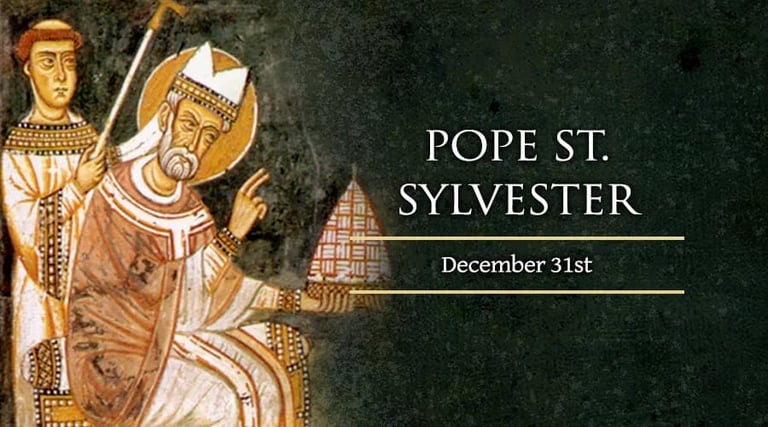Saint of the day December 31, 2024
St. Pope Sylvester 1
DAILY SAINT
Nirmala Josephine
12/31/20242 min read


Born in Rome toward the end of the third century, Pope Sylvester was the leader of the Catholic Church at a great turning point in the Church’s history. For the first time in nearly 300 years, Christians were freed from the threat of persecution. The powerful emperor, Constantine, gave Christians the right to practice their faith openly. Constantine even made Sunday a weekly holiday.
Constantine’s interest in Church matters could have created problems if Pope Sylvester had not been such a wise leader. Constantine often stepped in to settle Church disputes and he encouraged bishops to come to him with problems. The pope could have accused Constantine of interfering in the Church, but he did not do that. Instead, Sylvester encouraged an attitude of cooperation and peace between the Church and the state for the first time in history.
Constantine even called the bishops together for the first ecumenical council, called the Council of Nicea. The purpose of the meeting was to debate the teachings of Arius and his followers who were dividing the Church. Arius taught that Christ was not equal to God. The council, which was not even attended by Pope Sylvester because of his advanced age, determined that Arius’ teachings were false. Through their discussions at the meeting, the bishops made clear what the Church believes about Jesus. The writing of the Nicene Creed, which we pray at Mass every week, began at this ecumenical council.
Constantine’s generosity was also a great service to the Church. He donated property and buildings for Church use and he supported Church charities, especially for orphans, widows, and people in debt. Through all of Constantine’s efforts to assist the Church, Pope Sylvester I was able to maintain the Church’s independence without arguing with Constantine. The pope was both firm and considerate. During his reign as pope, Sylvester continued to do the Lord’s work quietly. Tradition tells us that in one month alone, he ordained 42 priests, 25 deacons, and 65 bishops. These ordinations, performed in a new spirit of freedom, made it possible for the Church’s mission to grow in the world. While he was the pope, St. Peter’s Basilica in Rome, part of today’s Vatican City, was constructed. He was a pope for nearly 25 years and died on 31st December in 335
Reflection
The example of St. Sylvester teaches us the importance of cooperation and unselfishness. Jesus calls us to work for the good of all, as Pope Sylvester did.
As we honor Pope Sylvester today, ponder the fact that in many ways, the Church we have today began with him. Though the faith was purified and articulated in the first centuries, the great basilicas, ecumenical councils, and organized administration of the Church began with Pope Sylvester. Pray for the Church today as we honor this important pope. The Church always has and always will be flawed in her members and leaders. Still, the fact that the Church has survived for more than 2,000 years is a testimony to its divine institution and a guarantee from Christ that the gates of hell will not prevail against it when Peter, in the person of the pope, remains in charge.
